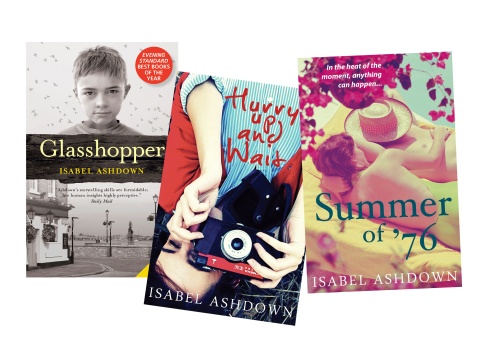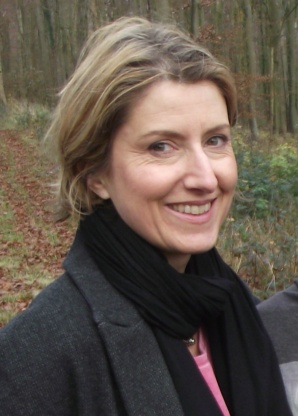Isabel Ashdown. Writing the close up and personal
Isabel Ashdown is a writer who can make the ordinary extraordinary. Her perceptive stories create characters you care about, and Isabel’s attention to detail is so seamlessly applied to the narrative that the reader becomes easily immersed in their worlds. These are the skills that make Isabel’s books invaluable reads for any writer struggling with characterisation and the way to create a credible world around them.
How do you go about writing? Do you have the plot worked out ahead of time or do you just sit down and write?
My writing always begins with a seed of an idea – a what if? – and a strong sense of a character. Once I have these two things I can throw myself into getting words down, into finding and refining the voice, and it’s not until that’s firmly located and flowing that I can even start to think about plot.
In Summer of ’76 my what if? was: ‘What if adults were misbehaving in a small community – and what if their teenaged kids found out? Imagine the shame. How would that unfold?’ Whether I’m reading or writing, character is king – above any amount of genius plotting and lyrical prose. I have to feel something for the character, care about them, be intrigued enough to follow them on their journey and turn the page.
If you do work out the plot ahead of time, what considerations do you give to the type of characters you are going to have in your stories with regards to the dynamics of their relationships?
In my novels to date, the plot (or at least a loose version of it) doesn’t emerge until at least a third of the way in. At that point I’ll jot down a sketchy idea of the narrative direction, knowing full well that it will shift and alter as the story develops. That’s one of the most exciting feelings – the knowledge that your own story has all these secrets to tell, secrets unknown even to you as writer.
You write about the ordinary, everyday experiences, so how you turn the mundane into something interesting?
I’ve always been interested in the concept of the outsider, and of the large dramas that play out in small places. After all, who hasn’t, at some point, felt like the outsider, or felt trapped in some way? I think we’re interested in the everyday stories of life because we can all relate to them on some level.
Many of my readers tell me my books ‘could have been written about my own school/town/family/friends’ – and I guess that’s because I write about things that are common experiences – the agonies of adolescence, the pain of loss, the cold-sweat of bad judgement, the laughter of embarrassment. Perhaps reading about these things makes us feel less alone, and somehow, more connected to the world?
Your writing is very intimate and on a small scale, yet it covers a great deal of ground with regards to relationships. There’s also a great deal of detail in the way you write. Why do you think it is you write in this way?
I’ve always been one to stop and stare! I can find myself gazing out across the park, captivated by the relationship between two dogs on the playing field; or sitting on a train, tuning into a tense conversation between a mother and daughter in the seat behind me. I’m endlessly fascinated by family relationships, as they’re rarely simple, with every member viewing life and events from a different angle, shadowed by the disparity of personal experience. Every family, it seems, hides secrets – and for any writer, surely, that’s just too interesting to ignore.
Do you visualise the scenes as you’re writing them?
Very much so. If I’m writing about real places, I like to revisit them, to write there, walk the paths, breath the air. Whilst writing Summer of ’76, I spent much time in my campervan on the Isle of Wight, in order to create an authentic, if fictional, representation of the book’s location. I’ve fallen in love with the island over the past five years, and now think of it as a second home.
What different methods do you use to build a description of a character for your readers and how do you convey the sense of the relationships between them.
Initially, my characters are fairly shadowy – at the outset I have more a sense of their essence than their image. Gradually I discover more, as their physical appearance shows itself on the page, and the relationships they share with others exposes new dimensions, both through their actions and their dialogue. It’s a bit like peeling away layers of wallpaper in an old house, discovering something new beneath each sheet, but never quite knowing if I’ve reached the base layer yet.
You’ve used different points of view in your writing (Glasshopper is written in first person, Summer of ’76 and Hurry Up and Wait third person) why do this and what effect you do think it has on the storytelling?
I tend to follow my instinct where point of view is concerned. With Glasshopper, I wanted Jake in the first person, present tense, to convey the impatience and immediacy of youth. I needed my thirteen-year-old to inhabit that place where the world is all about me, and all about now, and so this was a natural fit. I loved writing Jake’s voice! With the next two novels, however, my characters benefitted from the slightly detached distance that comes with third person, whilst at the same time, allowing the reader to remain close to the action and thoughts of those main characters. For the novel I’m writing now, I have a number of voices, all third person, using both past and present tense. I think it’s important to listen carefully to the tone of the emerging story, and try to work out how it really wants to be told.
You were born in the 1970’s and your stories have relatively recent setting. You would obviously have to do some research for Summer of 76, but how much were you able to draw on from memory for Glasshopper and Hurry Up and Wait and how much did you have to research. There is the issue of to what degree do you think an author can rely on their memories of a particular era when they are writing about it later on in life?
Many of the elements in my books are drawn from memory of time and place, of social trends and cultural shifts – in fact it’s often these memories that first ignite my desire to write the stories. However, I’m very aware that memories are notoriously unreliable, so whilst these recollections were the trigger, I meticulously researched everything I believed to be true, which in turn led me to new discoveries and forgotten treasures. I like to draw on the material I store within me, but equally, I get a great thrill from following those uncertain information pathways and mining shiny new gems.
Do you think that you are still developing over time as a writer have you settled into particular style of writing both as a process and regards subject matter and its expression through the medium of words? If you are how do you think these changes are manifesting themselves?
In all aspects of my life, I hope I’ll continue to learn and develop for as long as I’m able! It’s something I realise is vital to my happiness – the opportunity to embrace new challenges, which is probably why writing fiction feels like a natural fit. The exploration of family drama continues to fascinate me – the shifting generations, the nuanced dynamics of close relationships, the secrets and lies we harbour, for good or bad. The ideas I work on are often seedlings I have carried with me for several years while they grow and take shape, and of course with each new novel, and with the passing of time, I grow a little more; I know a little more.
What are you working on at the moment?
I’m deep in the writing phase of my fourth novel, which, like my others has a coastal setting, but this time it’s North Cornwall. I stayed near Padstow a couple of summers back, with the grain of this novel already nestled at the back of my mind. On arrival, we walked down to the beach at Treyarnon Bay at sunset, as all the holidaymakers and surfers were making their way home. The landscape is breathtaking, and immediately, I knew I had my location. As for the story itself, well, I’m afraid you’ll have to wait!




Great interview Elaine, I thought your questions were very shrewed and got the best out of Isabel. I love those three novels. I had the first two on my kindle and I didn’t think I’d ever get round to reading them. Then I got Summer in paperback, loved it and read the first two straght after it. It was a lovely reading phase for me. Can’t wait for her fourth.
I know you are someone who is really loves examining how writers build characterisation and relationships into a story. This is something Isabel excels at and also at making the ordinary extraordinary.
Elaine,
Your questions opened a space to explore how the exceptional (those ideas that an author brings to the foreground for our attention) is constructed from the mundane. Talking about the influence of the mundane brought the consideration of relationships into a clearer focus.
Great Stuff!
David
It interesting how a writer achieves this and, as you know, not the first time the blog has looked at how remarkable the ordinary or mundane become a thing of wonder.
The last time was in poetry with Matthew Clegg
It is probably why a writer can never tire of their craft.
Good questions and interesting responses. Thanks for a great interview, Elaine! I like the notion that a novel begins with a ‘what if’? I’ve never thought of that before, but I think I do it too to a certain extent. Like Isobel, I feel place is important too.
It’s nice to have things we may do as a writer, but may not have realised we were doing, brought out into the open. One of the joys of the blog is seeing this reflective process at work with everyone I interview. It helps me understand my own writing, sometimes addressing the blinds spots and other times the blank spots (to use a concept from the process of undertaking research).